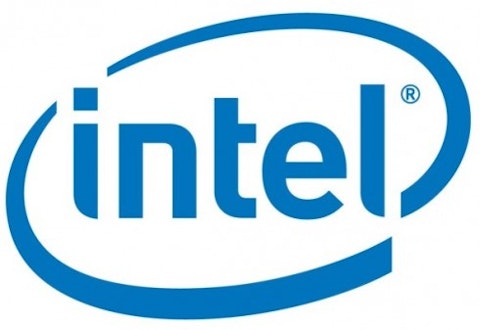Given the reality that the television industry is changing rapidly as new methods of content management and delivery become increasing viable, Intel Corporation (NASDAQ:INTC) does not want to be shut out. Particularly as the PC market continues to contract, Chipzilla is in need of a new growth area upon which to capitalize. A concerted effort to change the way we watch TV is not a bad place to start. To this end, Intel has promised to release its new Internet-based live TV product by the end of the year.
What is Intel TV?
The new service from Intel Corporation (NASDAQ:INTC) — which is expected to be called OnCue — is an attempt by the chip maker to deliver a full complement of live TV, on-demand content, and other options to consumers over a broadband Internet connection. Unlike other set-top boxes like Apple Inc. (NASDAQ:AAPL) TV, OnCue would not require a monthly subscription to any of the major cable or satellite providers like Comcast Corporation (NASDAQ:CMCSA) or Time Warner Inc (NYSE:TWX). The service would represent a major shift in the industry, and existing providers are fighting back.
What are the barriers for Intel TV?
The major hurdle that Intel Corporation (NASDAQ:INTC) must overcome is one of content. In early June, Reuters reported that Intel was in negotiations with several major content providers and was willing to pay as much as a 75% premium to get access to content. While it appears that no deals have been signed yet, Intel is driving the process and, I believe, with its offer of exposure on a new technology and a higher payout, content providers are likely to acquiesce.

The other major hurdles for Intel Corporation (NASDAQ:INTC) are the ones being raised by Comcast Corporation (NASDAQ:CMCSA), Time Warner Inc (NYSE:TWX), and other service providers. These have included financial penalties and incentives to channel owners to shun Internet-based options like OnCue, and in some cases have gone as far as to include outright exclusivity clauses or specific bans on Internet distribution of content. These practices have become of sufficient concern that the Justice Department has apparently begun looking into to possible antitrust violations in the industry.
Can Intel TV succeed?
The real question, of course, for both consumers and investors alike is whether Intel Corporation (NASDAQ:INTC)’s new venture can be successful. OnCue is a totally new way to deliver television to consumers and is an aggressive step by Intel. In contrast, Apple Inc. (NASDAQ:AAPL) has chosen to work with cable and satellite providers to enhance their services rather than compete with them. Even in cases where Apple has made deals directly with content providers like ESPN and HBO, this content is only available to users who already pay for those channels through a traditional distributor.
As with all things in this industry, content and cost are likely to lead the way. While I believe that TV ultimately must go online, the challenge for Intel Corporation (NASDAQ:INTC) as a first-mover will be convincing content providers to draw the ire of established distributors and manage costs. As other major players — Google Inc (NASDAQ:GOOG) with YouTube, for example — look to take live TV to the Internet, this seems like the inevitable direction of the market. Intel may face some growing pains along the way, but OnCue has great potential and, upon its release, is a reason to own the stock.
The article Intel Wants to Redefine Television originally appeared on Fool.com.
Fool contributor Doug Ehrman has no position in any stocks mentioned. The Motley Fool recommends Apple, Google, Intel, and Netflix. The Motley Fool owns shares of Apple, Google, Intel, and Netflix.
Copyright © 1995 – 2013 The Motley Fool, LLC. All rights reserved. The Motley Fool has a disclosure policy.





